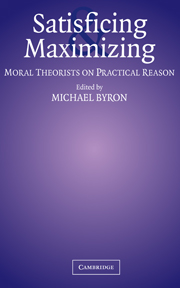Book contents
- Frontmatter
- Contents
- Contributors
- Introduction
- 1 Two Views of Satisficing
- 2 Satisficing as a Humanly Rational Strategy
- 3 Maxificing: Life on a Budget; or, If You Would Maximize, Then Satisfice!
- 4 Satisficing and Substantive Values
- 5 A New Defense of Satisficing
- 6 Satisficing: Not Good Enough
- 7 Why Ethical Satisficing Makes Sense and Rational Satisficing Doesn't
- 8 The Plausibility of Satisficing and the Role of Good in Ordinary Thought
- 9 Satisficing and Perfectionism in Virtue Ethics
- 10 Could Aristotle Satisfice?
- 11 How Do Economists Think About Rationality?
- Bibliography
- Index
2 - Satisficing as a Humanly Rational Strategy
Published online by Cambridge University Press: 04 December 2009
- Frontmatter
- Contents
- Contributors
- Introduction
- 1 Two Views of Satisficing
- 2 Satisficing as a Humanly Rational Strategy
- 3 Maxificing: Life on a Budget; or, If You Would Maximize, Then Satisfice!
- 4 Satisficing and Substantive Values
- 5 A New Defense of Satisficing
- 6 Satisficing: Not Good Enough
- 7 Why Ethical Satisficing Makes Sense and Rational Satisficing Doesn't
- 8 The Plausibility of Satisficing and the Role of Good in Ordinary Thought
- 9 Satisficing and Perfectionism in Virtue Ethics
- 10 Could Aristotle Satisfice?
- 11 How Do Economists Think About Rationality?
- Bibliography
- Index
Summary
Two Kinds of Strategies
Suppose I need to decide whether to go off to fight for a cause in which I deeply believe, or stay home with a family that needs me and that I deeply love. What should I do? My friends say I should determine the possible outcomes of the two proposed courses of action, assign probabilities and numerical utilities to each possibility, multiply through, and then choose whichever alternative has the highest number.
My friends are wrong. Their proposal would be plausible in games of chance where information on probabilities and monetarily denominated utilities is readily available. In the present case, however, I can only guess at the possible outcomes of either course of action. Neither do I know their probabilities. Nor do I know how to gauge their utilities. The strategy of maximizing expected utility is out of the question, for employing it requires information I do not have.
Nevertheless, my friends have not given up trying to help, so they point out that I could simulate the process of maximizing expected utility by assuming a set of possible outcomes, estimating their probabilities, and then making educated guesses about how much utility they would have. I could indeed do this, but I decide not to, for it occurs to me that I have no reason to trust the formula for maximizing expected utility when I have nothing but question marks to plug into it.
- Type
- Chapter
- Information
- Satisficing and MaximizingMoral Theorists on Practical Reason, pp. 30 - 58Publisher: Cambridge University PressPrint publication year: 2004
- 14
- Cited by



